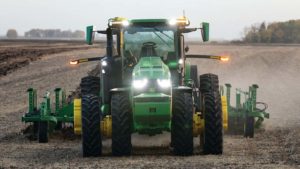CLICK HERE for the latest market quotes from the Iowa Agribusiness Network!
CLICK HERE for the latest market quotes from the Brownfield Ag News Network!
CLICK HERE for the latest market quotes from the Iowa Agribusiness Network!
CLICK HERE for the latest market quotes from the Brownfield Ag News Network!
(Radio Iowa) – While many of the state’s leaders are crowing over income tax reforms they’ll propose in the legislative session that will open next week, Iowa’s Secretary of Agriculture Mike Naig says lower taxes would certainly benefit farmers, but that’s far from his only priority. Naig says, “We’re also looking at how can we continue to advance and strengthen renewable fuels, particularly around ethanol and biodiesel but really, all forms of renewable energy in Iowa.”
The state ag department is also working on efforts to expand agricultural markets and to protect the mainstay markets that are driving the state’s economy. “Whether that be expanding small and mid-sized meat processing or doing more to connect local and regional foods to consumers,” Naig says. “Those are positives. Those are things we get to look at to expand our marketplace.”
Naig says much of the heavy lifting has been done on water quality and the state’s initiative, but they will continue to build on water and soil conservation efforts and rewarding producers for climate-smart practices. “We’re always going to be focused as we go into the session on looking at how do we further strengthen our efforts around foreign animal disease prevention and preparedness,” Naig says. “That includes things like making sure we have a world-class vet diagnostic lab at Iowa State University.”
The 2022 Iowa legislative session opens Monday.
(Radio Iowa) – Iowa’s largest manufacturing employer is using this year’s Consumer Electronics Show to introduce its first autonomous tractor. Quad Cities-based John Deere put on an hour-long, multi-media presentation Tuesday, showing off the tractor that’ll be available later this year. Deere’s Deanna Kovar says autonomous tractors will help farmers do their difficult, time-consuming jobs.
“I like to think of this autonomous 8R tractor as one giant robot,” Kovar says. “It goes through the field autonomously, within an inch of accuracy, and it’s able to perform its job without human intervention.” Farmers can operate and monitor the tractor from their smartphone, tablet or computer, and she thinks it’ll give them more time — to run their farms and to spend with their families.

Deere photo of autonomous tractor.
Deere’s presentation featured Doug Nimz, a corn and soybean farmer from Minnesota, who’s shown in the video operating a tractor with his phone. “The thing that excites me the most about autonomy is not being locked in the tractor cab all day. It will just allow me to run my business better because I can just pay closer attention to other tasks,” Nimz says. “Now I’ll be doing the jobs we always wanted to get done but never had time to because we were in the cab all the time.” Nimz says farmers are traditional as a rule, but he believes they’ll soon accept autonomous tractors, adding, “It will be a life changer for me.”
(Radio Iowa) – With the approach of the one-year anniversary of the January 6th attack on the U-S Capitol, Iowa Senator Chuck Grassley says he’s satisfied with his safety in the building and he has no fears there will be any sort of repeat attempt to storm the capitol on Thursday. “I feel very secure,” Grassley says, “and I don’t expect anything to happen because of the increased security and particularly bills that have been passed where very quickly, National Guard can be called out.”
A U-S Attorney’s Office report says that over the past year, more than 725 people were charged with participating in the riot, several of them from Iowa. The incident left four rioters dead and more than 150 law enforcement officers hurt. One officer died of a stroke shortly after the riot while several more took their own lives in the following weeks.
Senator Grassley is applauding Biden Administration efforts to combat anti-competitive practices in the meatpacking industry. Up to 800-million dollars in loans and grants will aid small-scale beef, pork and poultry plants while setting up a new hotline for whistleblowers. Grassley, a Republican, says his response to the move is “Hallelujah.” “The big four packers control 85% of the daily slaughter,” Grassley says. “They can and, in fact, do abuse the market power while the retail price of meat has gone up, independent producers are getting less and less.”
Grassley says he fully supports administration efforts to bring fair prices to both producers and consumers, though he recognizes it will also take legislation. Grassley says he has a bi-partisan bill in the works. “It’s called the Cattle Price Discovery and Transparency Act,” Grassley says. “It’ll create fair market conditions for independent producers and reign in some of the bad behavior of the big packers.”
If the administration wants a solution for small producers and for consumers, Grassley says the president should endorse the bill and lobby for its swift passage.
The Humane Society led the ballot initiative that passed Proposition 12 in 2018 with almost 63% of the vote. Hormel meats said it planned to be compliant by the first of January, while Hatfield plans to be crate-free by December 2022. Tyson says it will come into compliance, but the company’s President and CEO said it was something the company was not excited about in an August earnings call.
Other groups, like the National Pork Producers Council, said the law is unconstitutional and will only drive up prices for consumers in California. Roughly 4-5% of pork producers are compliant with Proposition 12, according to the NPPC, and California consumes about 13% of pork in the United States.
Businesses who don’t comply with the law, and use meat that does not meet the requirements can be fined up to $1,000 and jailed for up to 180 days. The National Pork Producers Council is suing Karen Ross, the Secretary of the California Department of Food and Agriculture. The United States Supreme Court could decide to hear arguments on the appeal of that case as early as Friday.
(Radio Iowa) – The Biden Administration is providing another 800 million dollars to support smaller scale beef, pork and poultry plants and is establishing a new tipline for whistleblowers from the meatpacking industry. President Biden says the four largest meat packing companies are distorting prices for farmers and for consumers. “Capitalism without competition isn’t capitalism. It’s exploitation,” Biden said. “That’s what we’re seeing in meat and poultry — in those industries now.”
U.S. Agriculture Secretary Tom Vilsack says the goal with this new batch of federal grants and loans is to invest in at least 15 small packing plants and to take steps to recruit and train new workers for the industry. “Then $50 million of it is going to be utilized for technical assistance and research,” Vilsack says. “We’re going to need a lot of innovation in this industry. We’re going to need to new business models…and small and mid-sized facilities need to have this opportunity, as opposed to the ‘big four.'”
The ag department and the U.S. Justice Department are creating a new portal to handle reports of anti-competitive behavior in the meatpacking industry. U.S. Attorney General Merrick Garland says the agencies are committed to vigorous enforcement of anti-trust laws. “When we talk about promoting competition in the agricultural sector, we are talking about whether a farmer or rancher will be paid a fair and competitive price for their goods and labor,” Garland says. “When we talk about protecting consumers in this context, we are talking about whether food will be affordable for everyone in America.”
Iowa Farm Bureau president Brent Johnson participated in yesterday’s (Monday’s) White House forum. Johnson urged Biden to work with Iowa’s congressional delegation on a price transparency bill to ensure farmers are paid an honest price for their cattle, hogs and poultry. Several of the Iowans who serve in the U.S. Senate and House said via Twitter that they were pleased to see the bipartisan bill was highlighted during Monday’s summit.
(Radio Iowa) – Some Iowa families have a tradition of taking down the Christmas tree on this last day of the year in order to start the new year out fresh tomorrow. Horticulturist and extension educator John Fech says don’t just toss the tree to the curb, but find a way to repurpose it. “Recycling it, reusing it, thinking of it again as a resource or an asset,” Fech says.
If you’re crafty, trim the branches to make a fragrant sachet, wreath or garland to enjoy in the weeks ahead. You could also cut up pieces of the evergreen to toss in a nearby lake or pond to provide a habitat for fish. Fech says mulching is another option. “Do that yourself with a hatchet or you could have it run through a chipper,” Fech says. “Many of the cities do that for their parks and then they use that for trail cover around city parks and hospitals and places like that.” 
Another idea is to return the tree to the great outdoors for wildlife to use as shelter. “Also, it could just be songbird habitat,” Fech says. “Set it near the bird feeder so birds have a place to get out of the wind and have a little bit of refuge from predator birds.”
If mulching the entire tree is too much work, just using the needles can be an effective mulch on perennial plants, in your garden and to keep weeds in check.
(Iowa DNR News) – What are your plans for New Year’s 2022? Iowa state parks and forests invite you to join the First Day Hike Challenge. Visit state parks on your own, or join a guided hike at more than 20 parks and forests. Whichever works for you, check in and take part in the First Day Hike Challenge through the State Park Passport!

Be sure to look under your park’s “More Info” tab on the Passport to see a Suggested Trail from park staff!
The temperatures may be chilly this weekend, so please dress for the weather! Please wear hats, gloves and warm boots.
Learn more about the First Day Hikes and sign up for the Passport today!
(Radio Iowa) – The latest Iowa State University Extension survey showed the price of farmland was up 29 percent — but the landowner profile has not changed very much. I-S-U Professor Wendong Zhang oversees the survey. “When you are thinking about the general trends, they are still consistent in historical patterns where you see a minor dip in the share bought by farmers and from a 22 to 25 percent increase for investors. But still, investors are not in the dominant category,” Zhang says. He says the type of seller hasn’t changed very much either.
He says 55 percent of the sellers are still estate sales and the sales by retired farmers — which is slightly higher than last year. “Some that are encouraged by the high prices. Some are concerned by the potential tax changes,” he says. One thing hasn’t changed, Zhang says those who own farmland in Iowa keep it. “Regardless of who they are — they tend to hold onto the land for a long time. So, half the land in Iowa is owned by the same owner for over 20 years. So, farmers are hoping for the appreciation — especially given the current tax law — you don’t necessarily have to pay capital gains taxes,” according to Zhang. Inflation has been an issue that’s hit a lot of areas — but he says it’s not major for farmland.
“Iowa doesn’t necessarily see as much influence because we have restrictions on corporate land ownership. Illinois probably sees a little more of that inflation,” Zhang says.
Des Moines, Iowa – Iowa Governor Kim Reynolds, Thursday (Today) signed an extension to the proclamation relating to the weight limits and transportation of grain. The proclamation is effective immediately and continues through January 29, 2022. It allows vehicles transporting corn, soybeans, hay, straw, silage and stover to be overweight (not exceeding 90,000 pounds gross weight) without a permit for the duration of this proclamation.
The proclamation applies to loads transported on all highways within Iowa (excluding the interstate system) and those which do not exceed a maximum of 90,000 pounds gross weight, do not exceed the maximum axle weight limit determined under the non-primary highway maximum gross weight table in section 321.463 (6)(b) of the Iowa Code by more than 12.5 percent, do not exceed the legal maximum axle weight limit of 20,000 pounds, and comply with posted limits on roads and bridges.
See the proclamation in its entirety, here.